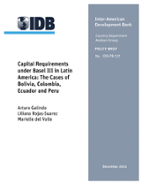Capital Requirements under Basel III in Andean Countries: The Cases of Bolivia, Colombia, Ecuador and Peru
Date
Dec 2011
Since the eruption of the global financial crisis in 2008 international setting bodies and local regulators around the world have been hard at work designing and implementing new regulatory frameworks to deal with the regulatory deficiencies that were exposed during the crisis. In particular, there is now a consensus that existing regulations in developed countries were not able to contain excessive risk-taking activities by financial institutions in this group of countries during the pre-crisis period. Among these regulations, the newly proposed set of reform measures developed by the Basel Committee on Banking Supervision (BCBS): "Basel III: A global regulatory framework for more resilient banks and banking systems" (2011) is perhaps the one that has attracted most attention worldwide because a central focus of the recommendations lies on important changes in banks' regulatory capital requirements. Where does Latin America stand with respect to capital requirements? Can banks in the region satisfy with ease the new capital requirements of Basel III or will the implementation of this new set of capital recommendations require large efforts from banks in the region? This paper deals with these questions for the case of four Andean countries: Bolivia, Colombia, Ecuador and Peru.



